Life Sciences News
See our Latest Journal Publications
The dirty truth: how common are faecal bacteria on your everyday care products?
Dr Fabrizio Alberti and Dr Pan Prasongpholchai recently tested toothbrushes for the presence of bacteria for a BBC Morning Live item about dirty toothbrushes. The episode aired on Friday 25 October.
Watch the clip on iPlayer.
Find out more in the Alberti Lab blog.
The University of Warwick celebrates the successful harvest of "GODIVA" and ‘OLIVIA’ – two novel dry beans inspired by local cultural history.
Researchers at Warwick Crop Centre have celebrated the successful harvest of a homegrown bean developed to thrive in a British summer.
Press Release (9 September 2023)
Professor Eric Holub and research fellow Rosanne Maguire discuss the novel bean varieties on BBC CWR.
Producing a baked bean suitable for growing in the UK
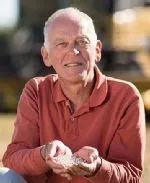 On Thursday 13 October, Professor Eric Holub, a plant scientist at Warwick Crop Centre, was featured on Channel 5 discussing his research to produce baked bean varieties suitable for growing in the UK climate on a commercial scale.
On Thursday 13 October, Professor Eric Holub, a plant scientist at Warwick Crop Centre, was featured on Channel 5 discussing his research to produce baked bean varieties suitable for growing in the UK climate on a commercial scale.
Growing haricot beans in the UK will offer a low food miles alternative supply model to those currently imported from North America.
Watch Secrets of Your Supermarket Shop: Episode 6 (from 28 mins).
Digging for Britain - DNA testing
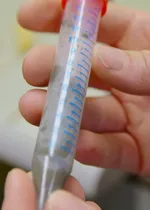 On 5 January Professor Robin Allaby featured in the BBC's Digging for Britain programme. He discussed the DNA testing of sediment from a Mesolithic settlement located on the seabed of the Solent. The analysis determined what was being eaten by the Mesolithic people. The appearance of wheat, 2000 years earlier than previously accepted was a major revelation.
On 5 January Professor Robin Allaby featured in the BBC's Digging for Britain programme. He discussed the DNA testing of sediment from a Mesolithic settlement located on the seabed of the Solent. The analysis determined what was being eaten by the Mesolithic people. The appearance of wheat, 2000 years earlier than previously accepted was a major revelation.
Watch on iPlayer (from 46:10)
Arctic Drift: A Year in the Ice - watch the documentary on 16 October
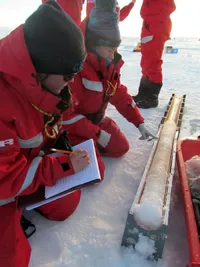 On Saturday 16 October 2021 at 6:30pm, Channel 4 will be showcasing the documentary 'Arctic Drift: A Year in the Ice', covering the goal of MOSAIC and the science undertaken during the Expedition.
On Saturday 16 October 2021 at 6:30pm, Channel 4 will be showcasing the documentary 'Arctic Drift: A Year in the Ice', covering the goal of MOSAIC and the science undertaken during the Expedition.
In September 2019, the icebreaker RV Polarstern left her home port in Bremerhaven to sail north. Her goal was to act as the Multidisciplinary drifting Observatory for the Study of Arctic Climate (MOSAiC), the largest Arctic Research Expedition ever undertaken, with the collaboration of over 80 institutions from 20 countries, to study both winter and summer processes and relationships between ocean, ice and atmosphere.
University of Warwick SLS scientists Dr Alison Webb, Professor Hendrik Schaefer and Professor Yin Chen, undertook the 'Sea Ice Microbiology and the Role in Cycling of Sulfur' (SIMbRICS) Project during the second half of MOSAiC. Overall, this project, in collaboration with the University of Groningen (NL) and the University of East Anglia (UK), aimed to study the in-situ production of the climate-relevant biogenic gas dimethylsulfide (DMS) and to link this with the diversity of the microbial community.
As the sea ice transitioned from the long Arctic winter, through a short spring to summer of 24 hours of daylight, ice melt created a highly variable environment of meltponds and a stratified surface ocean, which changed again through the onset of autumn. These changes create a high stress environment for the microbiome and the SIMbRICS project is investigating how these changing conditions affect the production of climate-relevant trace gases such as DMS.
Researcher on fast track thanks to dementia charity founded by F1 legend
Dr Emily Hill, a School of Life Sciences researcher investigating Alzheimer’s disease, has been named as one of four new Race Against Dementia Fellows, with the opportunity to receive support from not only leading scientists studying dementia, but also experts in innovation and problem solving from the world of Formula 1.
Press release (23 September 2021)
Hunting for life-saving phage in sewage
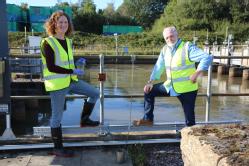 Dr Eleanor Townsend and Dr Ellie Jameson were part of a documentary on the ‘Secret Science of Sewage', aired on Thursday 18 March. The researchers were filmed collecting samples from Minworth Sewage works and characterising the phages they contain, as a possible solution in the fight against antimicrobial resistant bacteria. Dr Eleanor Townsend was filmed in the School of Life Sciences imaging suite, imaging the phages on the Transmission Electron Microscope. Dr Ellie Jameson discussed the results with Dr George McGavin.
Dr Eleanor Townsend and Dr Ellie Jameson were part of a documentary on the ‘Secret Science of Sewage', aired on Thursday 18 March. The researchers were filmed collecting samples from Minworth Sewage works and characterising the phages they contain, as a possible solution in the fight against antimicrobial resistant bacteria. Dr Eleanor Townsend was filmed in the School of Life Sciences imaging suite, imaging the phages on the Transmission Electron Microscope. Dr Ellie Jameson discussed the results with Dr George McGavin.
The Jameson laboratory, at the University of Warwick, is developing phage cocktails to prevent the most common UTI infections (Enterobacteriaceae) that can lead to severe complications. Findings have recently been published on the use of phages to prevent catheter biofilms: Townsend, E. M., Moat, J., & Jameson, E. (2020). CAUTI’s Next Top Model–model dependent Klebsiella biofilm inhibition by bacteriophages and antimicrobials. Biofilm, 2, 100038. This involves hunting for novel, diverse phages in sewage and characterising them.
The Jameson laboratory has also supplied their rigorously characterised phages for compassionate use in patients with no other treatment options. This work was recently peer reviewed and accepted in the journal; Phage - Townsend, E., Kelly, L., Gannon, L., Muscatt, G., Dunstan, R., Michniewski, S., ... & Jameson, E. (2020). Isolation and characterisation of Klebsiella phages for phage therapy. bioRxiv.
Work is currently being expanded to design phage cocktails to treat pneumonia, bloodstream infections and inflammatory bowel disease in collaboration with Professor Trevor Lithgow at Monash University.
Coronavirus: What is a second wave and is one coming?
BBC News talks to Dr Mike Tildesley about the possibility of a second wave and predicting when it might happen.
BBC News (24 June 2020)
Six Months of Coronavirus: What Have We Learned?
Professor Andrew Easton discusses the last six months on TRT World:
Dr Tildesley talks to BBC News about plans to ease lockdown
Dr Mike Tildesley talks to BBC News about the UK government's plans to ease the lockdown, the need to maintain social distancing and the importance of the R number to stopping the spread of Covid-19.
(BBC News Channel - 10.05.2020)
Researcher discusses slime mould on The One Show
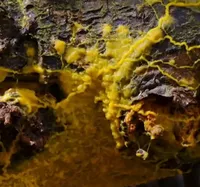 On Tuesday 31 March, Ian Hands-Portman took part in The One Show discussing the networking ability of slime mould.
On Tuesday 31 March, Ian Hands-Portman took part in The One Show discussing the networking ability of slime mould.
Watch on BBC iPlayer (item is 11 mins in).
Learn more about Slime Moulds.
Professor Andrew Easton discusses the potential development of Covid-19
Andrew Easton, Emeritus Professor of virology from the University of Warwick's School of Life Sciences, discusses the potential development of COVID-19 (coronavirus) vaccines live on anews (19 March 2020).
Dr Mike Tildesley discusses the coronavirus pandemic
Dr Mike Tildesley, Associate Professor of Life Sciences, discusses the coronavirus pandemic and what lessons can be learned from previous outbreaks of flu (TRT World Now, 18 March 2020).
Coronavirus:Your Questions
Dr Mike Tildesley answers viewers' questions about coronavirus on the BBC News Channel (Broadcast 09.03.2020).
Professor Andrew Easton comments on the Coronavirus outbreak
Professor Andrew Easton talks live to Sky News about the ongoing Coronavirus outbreak:
Seed collection conserves genetic diversity of vegetables
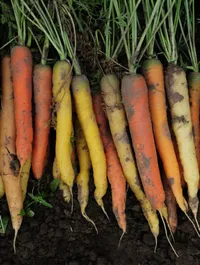 Listen to Dr Charlotte Allender discuss the need to conserve the genetic diversity of vegetables, and how this is being done at the University of Warwick's seed bank facility.
Listen to Dr Charlotte Allender discuss the need to conserve the genetic diversity of vegetables, and how this is being done at the University of Warwick's seed bank facility.
Radio discussion (28 Sept 2019)
The Warwick Genetic Resources Unit houses the UK Vegetable Genebank, a globally significant collection of around 14,000 seed samples of a range of vegetable crops.
How close are we to there being a British Baked Bean?
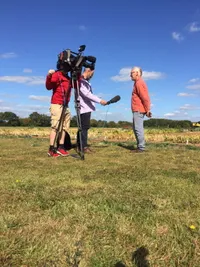 Dr David Gregory-Kumar from BBC Midlands Today reports on the harvest of the first full size field of a new variety of haricot bean bred by Professor Eric Holub for the UK's climate. Watch the report and read the press release
Dr David Gregory-Kumar from BBC Midlands Today reports on the harvest of the first full size field of a new variety of haricot bean bred by Professor Eric Holub for the UK's climate. Watch the report and read the press release
A cure for the common cold?
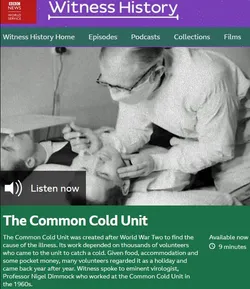 Did you know that SLS researchers have been leading work to find cures for the common cold and influenza?
Did you know that SLS researchers have been leading work to find cures for the common cold and influenza?
Listen as Professor Nigel Dimmock discusses his career and his new antiviral research on the BBC.
Download or listen online bbc.in/2GA7W74
When and how did we first start to domesticate wild plants?
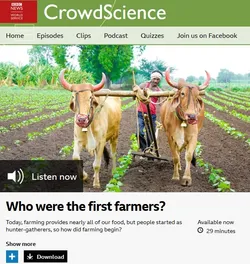 Professor Robin Allaby talks to CrowdScience on the BBC World Service and explains all.
Professor Robin Allaby talks to CrowdScience on the BBC World Service and explains all.
Listen to bbc.in/2JV7jpV (Interview starts at approx 5:28).
Sprout science
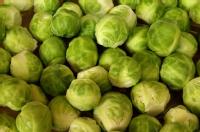 On Monday 18 December, Dr Guy Barker spoke on BBC Midlands Today on how Warwick Crop Centre are improving sprouts through traditional plant breeding. Watch www.bbc.co.uk/iplayer/episode/b09jg8fl/midlands-today-evening-news-18122017 (from 23 minutes)
On Monday 18 December, Dr Guy Barker spoke on BBC Midlands Today on how Warwick Crop Centre are improving sprouts through traditional plant breeding. Watch www.bbc.co.uk/iplayer/episode/b09jg8fl/midlands-today-evening-news-18122017 (from 23 minutes)
Dr Barker also spoke with Phil Upton on BBC Coventry and Warwickshire, describing how researchers are utilising genetic diversity from the UK Vegetable Genebank to enhance the appearance, quality and resistance of sprouts. Listen at www.bbc.co.uk/programmes/p05nlj64 (1:41-1:45)
